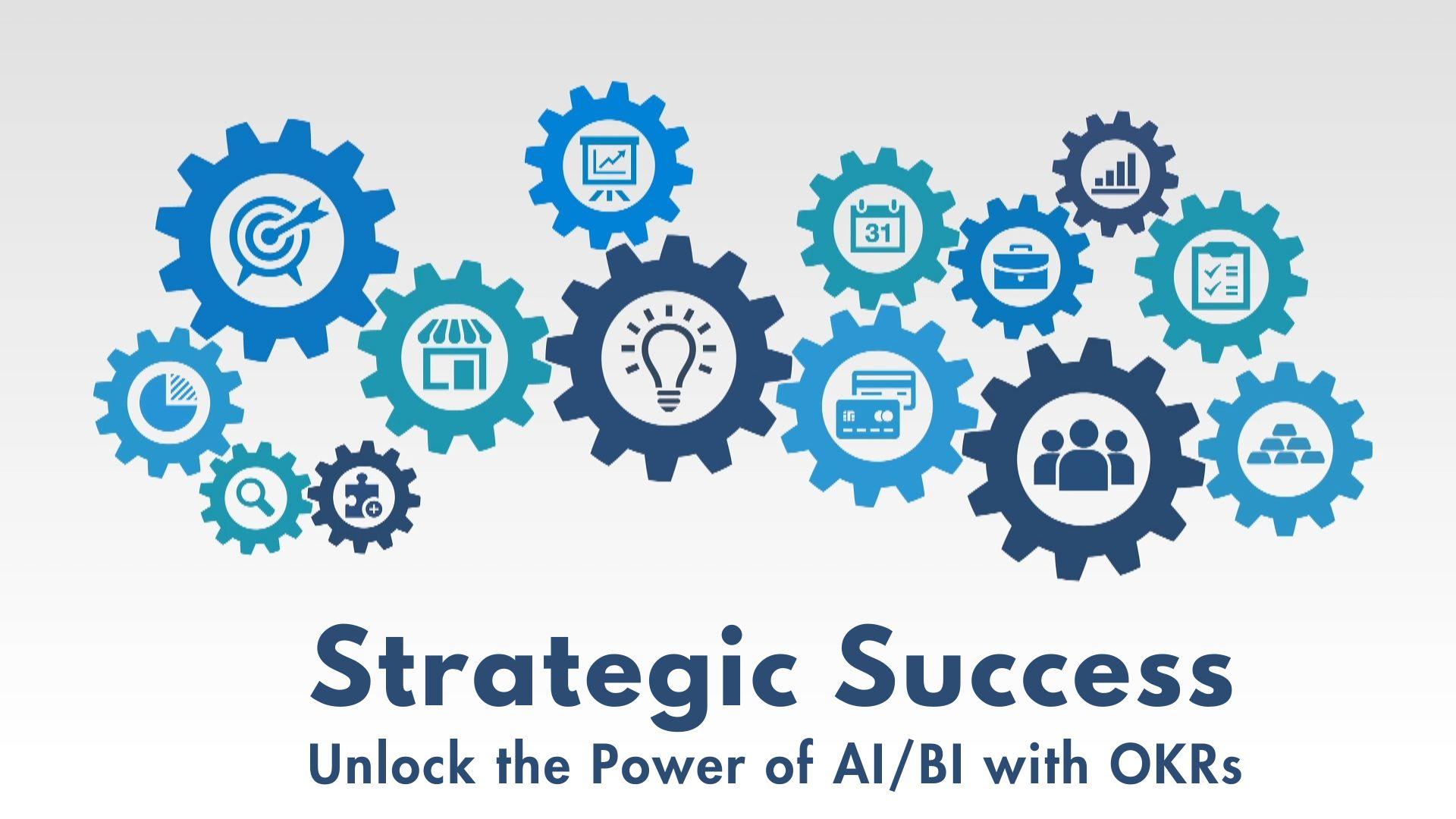Welcome to the gateway of strategic success, where the realms of Artificial Intelligence (AI) and Business Intelligence (BI) converge with the transformative force of Objective Key Results (OKRs). In this journey of exploration, we uncover the intricacies of achieving unparalleled success by unlocking the full potential of AI/BI through the strategic lens of OKRs.
BI Alignment: Setting Objectives for Data-Driven Decision-Making
In the fast-paced landscape of modern business, achieving success is intricately tied to the alignment of Business Intelligence (BI) with the Objective Key Results (OKRs) framework. This alignment is not just a strategic choice; it's a fundamental factor that can redefine the trajectory of organizational success. As we delve into this critical aspect, we uncover the depth of the relationship between BI and OKRs, recognizing it as a pivotal force in driving success.
The integration of BI and OKRs is a nuanced art, requiring a meticulous approach to setting precise objectives within the OKR framework. This section aims to provide a comprehensive understanding of the strategic importance of this alignment. Organizations, in their pursuit of harnessing the power of data, find in this fusion a transformative synergy that goes beyond the conventional boundaries of decision-making.
Emphasizing the significance of aligned objectives, we navigate through the intricacies of this relationship. Here, objectives cease to be mere checkpoints; they become the compass guiding businesses through the complexities of contemporary business strategies. As we explore the synergies between BI and OKRs, the importance of data-driven decision-making takes center stage. Data transforms from a passive resource to an active and guiding force, shaping the very core of strategic initiatives.
OKRs in BI Governance: Ensuring Data Quality and Compliance
Navigating the intricate landscape of Business Intelligence (BI) governance requires more than just a set of guidelines—it demands a strategic approach that aligns objectives with the Objective Key Results (OKRs) framework. In this segment, we embark on a journey into the realm of BI governance, where the utilization of OKRs serves as a guiding beacon through the complexities of ensuring data quality, integrity, and compliance with industry regulations.
The practical applications of OKRs in BI governance extend beyond theory, revealing their significance as tools that uphold stringent standards for data integrity. By aligning OKRs with data governance objectives, organizations not only meet compliance standards but also proactively shape an environment where data is respected, protected, and leveraged to its fullest potential. In essence, OKRs become the guardians of a data-driven culture, ensuring excellence in governance is not an option but a necessity.
BI Process Optimization: OKRs for Operational Efficiency
Operational Excellence as the Goal
At the heart of this section lies the strategic imperative of achieving operational excellence within the realm of Business Intelligence (BI). It emphasizes that operational efficiency is not just a desirable outcome but a critical goal for BI initiatives to thrive in the dynamic business landscape.
Facilitating Key Performance Milestones
The exploration emphasizes how OKRs serve as navigational tools, guiding BI teams to achieve key performance milestones. By setting specific, measurable, and achievable objectives, organizations can break down larger goals into manageable tasks, ensuring that each step contributes to the overarching objective of operational excellence.
Indispensable Role in Streamlining BI Processes
A focal point of the discussion is the indispensable role of OKRs in streamlining BI processes. By aligning objectives with specific process improvements, organizations can witness a seamless integration of strategic goals with day-to-day operations, fostering a culture of continuous improvement and adaptability.
Valuable Insights for Enhanced Productivity
The exploration culminates in offering valuable insights for those seeking to enhance productivity within BI processes. By leveraging the strategic nuances of OKRs, organizations can not only meet operational objectives but also foster a culture of innovation and adaptability, positioning themselves as agile players in a rapidly evolving business landscape.
In essence, this section serves as a comprehensive guide, shedding light on how OKRs are not just performance metrics but strategic tools that, when harnessed effectively, drive operational excellence within the intricate landscape of Business Intelligence.
BI Team Collaboration: OKRs Fostering Cross Functional Synergy
Foundations of Collaboration
Within the intricate landscape of Business Intelligence (BI), the section on BI Team Collaboration underscores the foundational importance of collaboration. It establishes collaboration as the cornerstone upon which successful BI initiatives are built, recognizing that the convergence of diverse skill sets and perspectives is key to unlocking the full potential of data-driven strategies.
Dynamic Role of OKRs
Delving deeper, the discussion unfolds to highlight the dynamic role of Objective Key Results (OKRs) in fostering cross-functional synergy within BI teams. By outlining the strategic integration of OKRs, the narrative emphasizes that these objectives serve as more than just benchmarks; they become catalysts for collaboration, communication, and the alignment of shared goals among team members.
The Glue of Shared Objectives
The illumination extends to illustrate how OKRs act as the adhesive that binds together the varied expertise present within BI teams. By setting objectives that encourage cooperation and collective effort, OKRs become the glue that unites individuals with diverse skill sets and backgrounds, forging a cohesive team aligned towards a common purpose.
Real-World Examples
The exploration advances with the presentation of real-world examples that vividly showcase how organizations have successfully implemented OKRs to foster collaboration in BI teams. These examples serve as practical illustrations of the transformative impact that OKRs can have in breaking down silos, enhancing communication, and creating a shared sense of purpose.
Strategic Insights
Complementing the real-world examples, the narrative incorporates strategic insights into the best practices and approaches for deploying OKRs to foster cross-functional synergy. This section provides actionable guidance, drawing on lessons learned from successful implementations, to assist organizations in navigating the complexities of collaboration within BI teams.
Driving Strategic Success
As a culminating point, the discussion reinforces that the collaborative approach facilitated by OKRs is not merely a supportive element but a driving force behind achieving strategic success. The cohesion forged within BI teams through shared objectives translates into increased efficiency, innovative problem-solving, and ultimately, success in navigating the ever-evolving BI landscape.
This section provides a comprehensive exploration of how OKRs function as more than a performance measurement tool—they become a strategic enabler that fosters cross-functional synergy, propelling BI teams towards collective achievement and success.
Continuous BI Improvement: OKRs for Skill Development and Innovation
As the landscape of Business Intelligence continually evolves, this final segment unveils the strategic use of OKRs in driving continuous improvement, skill development, and innovation within BI teams. OKRs are explored as a roadmap for skill enhancement initiatives, fostering a culture of continuous learning and innovation. By setting objectives that prioritize growth and development, organizations position themselves at the forefront of the rapidly changing BI landscape. This strategic approach ensures not only survival but flourishing in the era of technological advancements, where innovation becomes a core element of sustained success.
OKRs are unveiled as more than performance metrics; they are positioned as a roadmap for skill enhancement initiatives. This involves setting specific objectives geared towards the continuous development of skills and fostering a culture of perpetual learning within BI teams. The strategic application of OKRs ensures that skill development is not an isolated event but an ongoing process, aligning individual growth with overarching organizational objectives. By prioritizing growth and development through OKRs, organizations are better equipped to tackle the challenges presented by the rapidly changing BI landscape, ensuring that their teams are not just adept but are pioneers at the forefront of innovation.
Conclusion
In concluding our strategic journey through the realms of Artificial Intelligence (AI) and Business Intelligence (BI) enhanced by the transformative force of Objective Key Results (OKRs), we stand at the precipice of a new era in organizational success. The fusion of BI with OKRs emerges as more than a strategic choice; it is a fundamental redefinition of how businesses approach decision-making, governance, operational efficiency, team collaboration, and continuous improvement. This blog has illuminated the path to strategic success, where data is not just a tool but a guiding force. As organizations harness the full potential of AI/BI through the lens of OKRs, they position themselves not only at the forefront of innovation but as architects of their own sustained success in the dynamic landscape of technological advancements. The journey does not end here but extends into a future where strategic success is not just a destination, but a continuous odyssey fueled by the synergy of AI, BI, and OKRs.
Read More About BI
Frequently Asked Questions (FAQs)
OKRs serve as guiding beacons in BI governance, ensuring data quality, integrity, and compliance. By aligning OKRs with data governance objectives, organizations not only meet compliance standards but also actively shape an environment where data is respected, protected, and leveraged to its fullest potential.
OKRs act as catalysts for operational efficiency by guiding BI teams to streamline processes and achieve key performance milestones. From goal setting to execution, OKRs play an indispensable role in ensuring strategic goals seamlessly integrate with day-to-day operations.
OKRs become the glue that binds diverse skill sets together, encouraging collaboration and shared goals. Real-world examples and strategic insights showcase the transformative impact of OKRs in ensuring that BI teams work cohesively towards common objectives.
OKRs are a roadmap for continuous improvement, skill development, and innovation within BI teams. By setting objectives prioritizing growth and development, organizations position themselves at the forefront of the rapidly changing BI landscape, ensuring sustained success in the era of technological advancements.
OKRs play a strategic role in fostering a culture of continuous learning and innovation within BI teams. By setting objectives that prioritize growth and development, organizations ensure their teams not only survive but flourish in the ever-evolving BI landscape.

